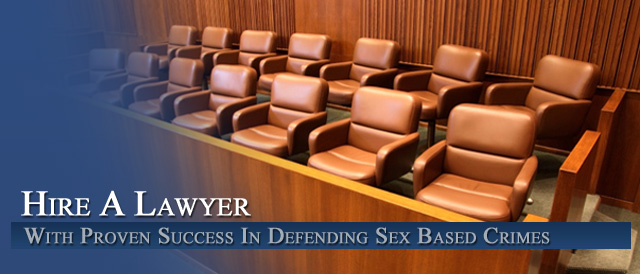




Colorado Criminal Law – Defending Against Sex Crimes Investigations – Understanding Your Rights During the Investigation Phase
by Colorado Criminal Defense Lawyer – H. Michael Steinberg for the Defense of Sex Crimes
Being on the target end of a sex crime investigation in Colorado is truly terrifying.
If you are already charged with sexual assault – the fear of public ridicule, conviction and incarceration may be much worse…
The category of sexual assault in today’s world is much broader than in past generatons. In fact, the vast majority of sexual assault crimes do not involve coerced sexual intercourse by a stranger (i.e. “rape”).
The following definition of sex offender in Colorado is based on statute.
A sex offense is:
(1) Sexual Assault;
(2) Sexual Assault in the first, second and third degree as it existed prior to July 1, 2000;
(3) Unlawful Sexual Contact;
(4) Sexual Assault on a child;
(5) Sexual Assault on a child by one in a position of trust
(6) Sexual Assault on a client by a psychotherapist;
(7) Enticement of a child;
(8) Incest;
(9) Aggravated Incest;
(10) Trafficking in children;
(11) Sexual Exploitation of children;
(12) Procurement of a child for sexual exploitation;
(13) Indecent Exposure;
(14) Soliciting for child prostitution;
(15) Pandering of a child;
(16) Procurement of a child;
(17) Keeping a place of child prostitution;
(18) Pimping of a child;
(19) Inducement of child prostitution;
(20) Patronizing a prostituted child, or;
(21) Internet luring of a child;
(22) Internet sexual exploitation of a child;
(23) Criminal attempt, Conspiracy, or Solicitation to commit any of the above offenses.
If you have been targeted for a sec crimes investigation in Colorado you should start the process of seeking – immediately – an experienced Colorado sex crimes criminal defense lawyer.
The following description of how police investigate sex crimes may assist you in not making your already difficult situation even worse.
These suggestions are not intended to be an instruction booklet on how to get away with a sex crime. The surest way to avoid being convicted of a sex crime is to avoid committing such crimes. However, if the crime has already been committed, you may avoid making your situation even worse by understanding how police investigate claims of sexual assault.
Do not talk to anyone about the situation and especially do not take any telephone calls from a person who may be a victim.
As you might imagine, sex crimes are difficult for law enforcement to investigate and they are difficult for the state to prove. Therefore, best source of evidence is the suspect himself. When a potential victim comes into a police station and reports that he or she was the victim of a sexual assault the first method of investigation that the police will frequently use is the recorded telephone call to the suspect. That is, before the suspect even knows that he is under investigation, the police will urge the victim to call the suspect and to attempt to get the suspect to talk about the offense or, worse, to admit to the offense.
Typically, the victim will tell the suspect that she is having problems about “what happened” and wants to know what the suspect plans to do about it. She will say that she really needs to “talk to someone” about what happened. The point of this, of course, is to urge the suspect to talk with her about what happened rather than to have the victim talk to a professional. Do not take any such calls.
Physical Incriminating Evidence
If a computer has been used in the commission of the offense the authorities will seek to seize and search it with your permission (I counsel against ever consenting to a search) or with a search warrant – if the authorities locate a judge who will issue one.
An attorney cannot be involved in any part of the disposition of possible evidence against the person being investigated. What to do with evidence of guilt is completely up to the person under investigation.
Colorado specifically REQUIRES lawyers to turn over incriminating evidence to the authorities
One principle emerges clearly from the case law: When the lawyer takes physical possession of incriminating evidence, he has an affirmative duty to give the incriminating evidence to the proper authorities.
Here are excerpts from this rule:
….If the incriminating evidence is removed from its location with the assistance of the attorney, then the details of where the physical item was found, the original condition of the item and any defense testing of the item are provable by the prosecution at the trial and must be disclosed regardless of the lawyer’s duty of loyalty to the client and the attorney-client privilege.
If the lawyer, acting in good faith, alters the crime scene by taking or disturbing in any way a physical item, the right of the prosecution to discover evidence of crime is hindered and the public interest in prosecution prevails over the lawyer’s duty of loyalty and the attorney-client privilege. In these situations, however, the client’s communication to the lawyer and the lawyer’s observations made as a consequence of protected communications are protected from disclosure except for the narrow area previously discussed.
Implicit in the reasoning of these decisions is the duty of the lawyer to preserve the evidence in the same form as it was found once he removes it. The prosecution will be deprived of the opportunity to discover the evidence if the lawyer destroys its tell-tale markings or wipes the object free from fingerprints.
When the lawyer receives incriminating evidence from his client or an agent of his client, he must voluntarily turn it over to authorities. In these situations, the identity of the client and the communication with the client must not be disclosed.
When the incriminating evidence is obtained through means independent of any client communication (i.e., through third parties) there is no attorney-client privilege and the attorney must turn over the item and may be compelled to testify as to the source of the evidence.
In these situations, the duty of client loyalty gives way to the need of the public to prosecute criminals and the duty of the attorney as an officer of the court.
The Lawyer and The Client – Be Careful At This Phase of The Case
A lawyer will not counsel you to destroy evidence. Encouraging another to break the law is a crime and could garner an enhanced penalty because of a lawyer’s position of trust. Encouraging a client to destroy evidence also would violate Model Rule 1.2(d), which precludes a lawyer from “counsel[ing] a client to engage … in conduct the lawyer knows is criminal,” and Model Rule 3.4(a), which states that a “lawyer shall not counsel or assist another person” to obstruct another party’s evidence or unlawfully destroy or conceal evidence. Advising a client to destroy evidence could fall within the crime-fraud exception to the attorney-client privilege or otherwise fall outside the scope of protected communications. Also, a dispute about counsel’s advice could turn counsel into a witness, create a conflict of interest with a client, and lead to disqualification.
Seizing the Computer As The Primary Piece of Evidence in a Colorado Sex Crimes Case
When the investigation includes suspicion of possessing child pornography the police will always seize the suspect’s computer. Although it is against the law to lie to police there is no law that requires you to assist the police in collecting evidence against you. If a computer was used in the commission of the offense the police are looking for emails, pictures, web searches, and similar sorts of evidence that may connect you to the victim. Even if you delete such items – forensic computer experts are able to examine the computer’s hard drive and, in many cases, they will be able to reconstruct deleted information.
You should also be aware that even if you have not downloaded child pornography your computer’s web cache may contain temporary images automatically downloaded from such web sites. Case law has held that may amount to possession of child pornography. Of course, the fact that you destroyed your computer for no apparent reason raises suspicion and it may even be admissible evidence at trial if you are charged.
You must ask however, in balance, and you must decide if it is better to be suspected of destroying evidence than it is to allow the police to seize the evidence and remove all doubt.
Do not submit to police questioning.
Police detectives are highly skilled and they are relentless in interrogating persons suspected of sexual assault. Do not submit to an interrogation- especially if you are innocent. Recent studies have shown a high incidence of false confessions in sexual assault cases. The researchers hypothesize that this is because suspects are led to believe that if they simply tell what happened the whole affair may be handled quietly but if the suspect refuses to answer questions there will be a very public investigation.
Do not fall for this tactic.
A very public investigation that results in no charges is far better than a very public prosecution, with a confession, that results in a very public conviction. Do not just tell the police that you choose to remain silent. The law permits them to attempt to persuade you to talk. Rather, tell the police that you will not talk without your lawyer. Under those circumstances the law requires the police to cease all questioning until the suspect has been provided counsel.
Other Articles of Interest:
- The Sex Crimes Investigation Phase – Issues and Tactics
- Understanding The Internet Crimes Against Children (ICAC) Task Force’s Impact on Colorado
- Colorado Sex Crimes Investigations – Beware Of Police Use Of Investigatory “Tactics”
- Colorado Police Investigations -The Denver Colorado Police Want To Talk To You – To “Get Your Side”
- What To Do If You Are Contacted by a Detective Investigating an Accusation of a Sex Crime












